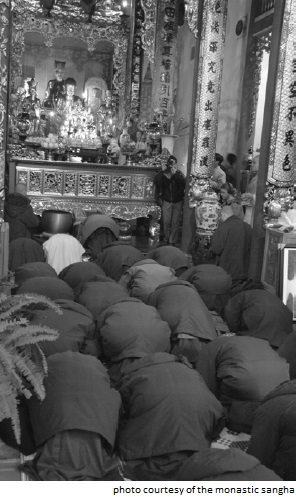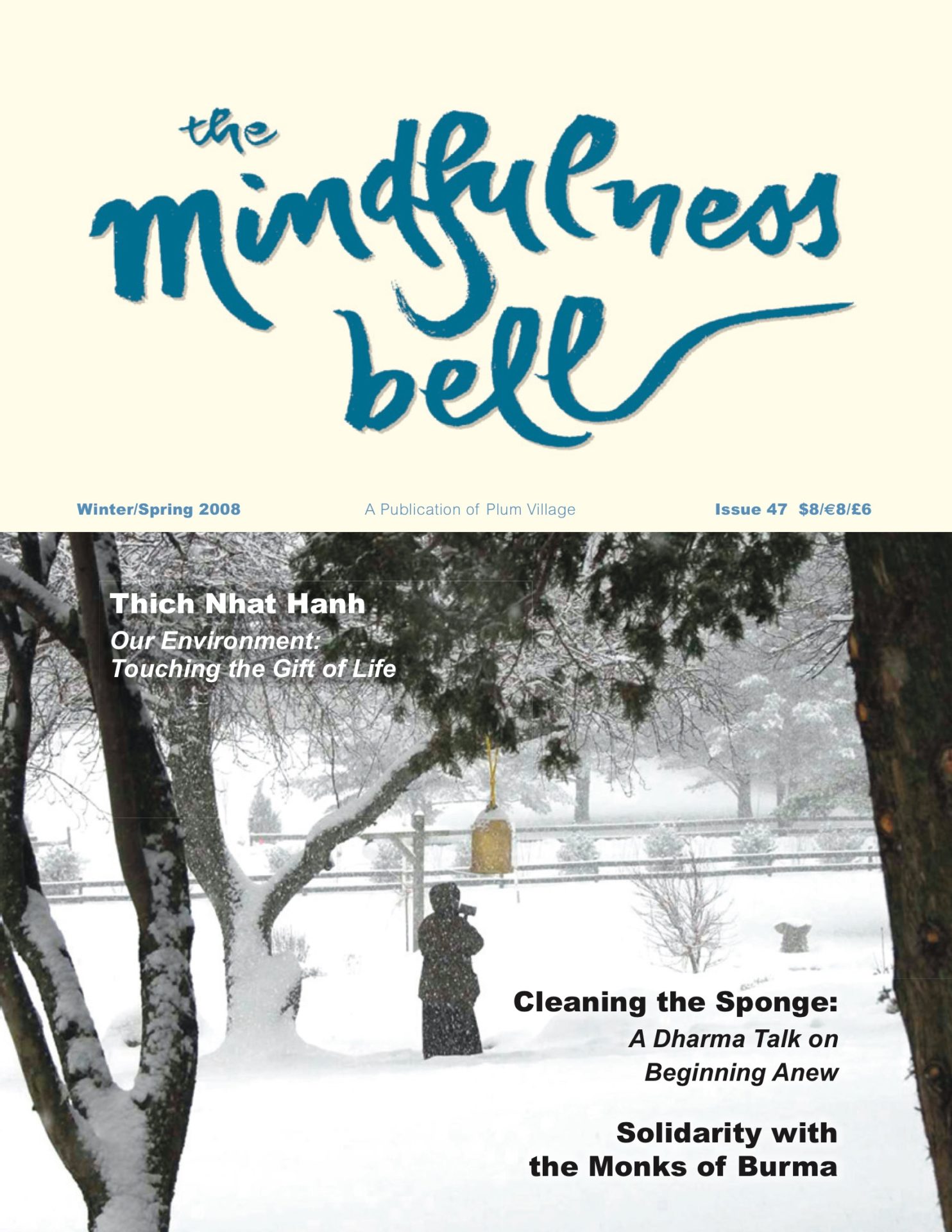Reflections on the Practice of Touching the Earth
By Larry Sipe

I have an eighteen-year-old son who is emotionally and verbally abusive. My relationship with him has been tumultuous. From affable and good-natured to explosively angry in the blink of an eye, he has punched holes in the wall, thrown objects (including a quart-sized Mason canning jar), and destroyed his bedroom with a baseball bat.
Reflections on the Practice of Touching the Earth
By Larry Sipe

I have an eighteen-year-old son who is emotionally and verbally abusive. My relationship with him has been tumultuous. From affable and good-natured to explosively angry in the blink of an eye, he has punched holes in the wall, thrown objects (including a quart-sized Mason canning jar), and destroyed his bedroom with a baseball bat. His anger goes on and off like flipping a switch. It radiates, filling the room with its presence. I am the focus of intense, often violent and irrational outbursts of anger in which he swears unrelentingly, alternating with periods when he is down to earth. Walking on eggshells around him, I adopt a careful living style. I am on edge constantly while waiting for the other shoe to drop, even during the good times. His expectations of me are never clear. Feeling frightened, unsettled, and off-balance, I anxiously await his next outburst or mood swing.
The stress at home is palpable. My son’s anger has nearly torn the family apart on more than one occasion. I love him, but I cannot live like this. Every day he grows angrier. He is highly unpredictable. He projects the blame for all his problems onto me. (He would not get angry if only I would do what he wants me to do.) He has an overwhelming need to dominate my actions in order to get his own way, resulting in jealousy of his sister based on perceived parental favoritism, manipulating situations to his own advantage, and threatening to do harm. More than once he has threatened my life—he has pulled a knife on me, threatened to beat me to death with the baseball bat he was holding, and menaced me with a hatchet during a confrontation at home. He has even threatened to kill me while I sleep.
Becoming a Person with PTSD
Faced with unavoidable stress sustained over years of caring for him, I was frequently, then constantly, on guard. Such conditions took their toll. Feelings of hopelessness developed, triggering depression. Avoidance of contact with all reminders (including my own thoughts) of my son became paramount. Contact set off intrusive, vivid flashbacks and nightmares in which I relived everything over and over again.

Gradually withdrawing and isolating myself more and more, I experienced a restricted range of emotional response. I felt disconnected, spacey, and unaware of what was going on around me. Misperceptions resulted from my confused thinking. I was not fully present for myself, let alone my son. Relationships were not being nourished. I was losing balance, falling apart, and becoming increasingly fearful. In this state the cycle of daily conflict with my son triggered an internalizing of the stress reaction. My severe and continuous emotional reaction to the traumatic events was subsequently diagnosed as Post-Traumatic Stress Disorder (PTSD). That was how I saw myself — as a person with PTSD.
At River Sangha, in Salem, Oregon, I was introduced at that time to a restorative practice: Touching the Earth. It is based on the Lotus Sutra with its elements of compassion and loving-kindness. My experience with this practice has been transformative. It is with a deep bow of gratitude that I offer the merits of this practice. In Touching the Earth, Thich Nhat Hanh writes: “When we touch the Earth, we take refuge in it. We receive its solid and inclusive energy. The Earth embraces us and helps us transform our ignorance, suffering, and despair.” This practice offers the opportunity to begin anew moment by moment.
To Touch the Earth
Joining my palms together to form a lotus bud, I kneel mindfully, and rest my feet, hands, and forehead on the floor. Palms are turned face-up in an attitude of openness to the Three Jewels—the Buddha, the Dharma, and the Sangha. Thay instructs me to follow my breathing and touch the Earth, releasing all my instability, fear, anxiety, and anger. I communicate gratitude, joy, and acceptance to Mother Earth. The Earth neither reacts nor judges me as it absorbs my negativity. This teaching resonates with me as I am prone to pull in rather than run toward challenges. Thay teaches peace is the way, and that it is available to all beings right here, right now. “With this practice, we cultivate a relationship with the Earth, and, in doing so, we restore our balance, our wholeness, and our peace.”
The practice of Touching the Earth is instrumental in allowing me to stop reacting to the self-destructive pattern of my PTSD and start responding to it. Touching the Earth affords me the opportunity to look deeply at past events, changing my experience of and relationship to the stressors that affect my well-being. The seeds of joy and happiness are watered, change is possible, and I am arriving home with each breath, even though I still experience PTSD. The changes occur in my mind. I evolve from seeing myself as a person with PTSD to seeing myself as a whole person. My feeling of being alive is restored!
To echo Joanna Macy in her classic memoir Widening Circles: “[Touching the Earth] did not alter the circumstances of my life, it removed no hardships. Yet it changed everything.” I am transforming into a peaceful warrior through the practice of Touching the Earth. As Thich Nhat Hanh writes: “The energy of mindfulness and concentration produced by Touching the Earth has the capacity to awaken us to the nature of reality, to transform us, to purify us, and to restore joy and vitality to our life.”
Touching the Earth affords an opportunity to heal and reconcile relationships, beginning with the relationship to one’s own heart and rippling outward to include all beings in all directions. Through this practice I am now more understanding and compassionate of my son. I open my heart to him as he has made me suffer. With awareness of this understanding and compassion, comes love. I know that he has had his own suffering to face — anger, pain, and hatred. His suffering has spilled over causing suffering to those around him. I want him to be open to life, to be happy and healthy. I do not want him to suffer or to cause others to suffer. The practice of Touching the Earth touches this relationship deeply, as well as all relationships. The interbeing nature of all beings is nurtured through such practice: connection with my son, the clouds, the blue sky, the earth, and all beings, is only possible in this moment — now.
Touching the Earth impacts my personal relationships and awakens me to the potential for beginning anew in the present moment. The opportunity is available for forgiveness and healing. Reconciliation is possible. Personal relationships, such as those with my son and Mother Earth, are nourished with this restorative practice.

Larry Sipe, Insight Embodiment of the Heart, lives in Salem, Oregon, where he works for the local school district and community college, and attends and co-facilitates River Sangha.

